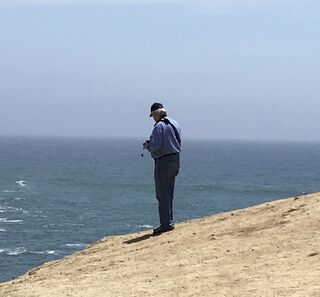Introversion
How Older Introverts Successfully Coped with COVID
A combination of age plus personality style.
Posted April 3, 2021 Reviewed by Gary Drevitch

I’m tiring of hearing about the fragility of older folks during this pandemic year. It’s true that people with pre-existing conditions are more vulnerable to a poor outcome from COVID-19. But that would also be true for younger people. And while many older Americans live alone, not all are lonely, alienated, or isolated. In fact, when you consider personality type as a variable, Introverts often prefer their own company—lurking virus or not.
For example, my brother is hermit-like in his lifestyle and a recent conversation with him reinforced the fact that many Introverts are not suffering nearly as much as they are portrayed in the media. My brother is 76 and has been single for many years. He has a cat, exercises by walking alone, enjoys his own cooking—definitely not gourmet but satisfying to him. He plays online video games with virtual opponents which satisfies his need for contact. He reads books that he can still get by appointment from the local library. He listens to music when the mood strikes him, just as he always has—on CDs and via the internet. He periodically takes his car for a ride to keep the battery alive and admires the outdoors safely from inside his vehicle or on solo hikes.
He is no less happy than he ever was. At this stage in his life, he can manage on income from Social Security. He still is in reasonably good health and is grateful for his low-stress existence. It helps that he is not particularly materialistic. But then, many seniors have enough of what they want and enjoy the peace and quiet of their existence. Like many others his age, he has a middle-aged daughter who lives thousands of miles away, with whom he maintains a mostly phone and email relationship—COVID or not.
If you are an older Introvert, you probably can relate to much of this lifestyle, though you may not be as austere as my brother. But if you are an extravert, what I’ve written above would seem torturous. So, key variables in reviewing your response to the past year’s lockdowns would be not just your financial situation, health situation, and family responsibilities, but your personality type.
This might be a good time to define introvert and extravert. Rather than go into great detail from a psychologist’s perspective, let me just frame it in terms of need for contact with other people. Introverts and extraverts approach life in different ways. Those who tend to be more introverted, by which I mean that they are comfortable learning and doing things alone, follow a more solitary style. Not that they avoid people, but unlike extraverts, they don’t require a daily dose of people. Introverts need solitude to collect their thoughts and recover from the energy required by spending time with others.
Extraverts tend to be energized by others and crave contact, and do best with projects that involve people. They are not happy campers when forced into isolating situations—like a shelter-in-place order. There is no particular advantage in being an Introvert or an extravert; neither is psychologically healthier or happier. Extraverts don’t intuitively understand the need for solitude. Introverts aren’t happy when forced to stay in social situations longer than necessary.
During this year-long COVID interruption, I believe Introverts have fared better than extraverts in general. This is true for me, being an introvert. When I’m alone, I’m invigorated and do my most creative thinking. A solo hike in the natural beauty of nearby hills and wilderness areas, wearing a mask, of course, leaves me inspired and restored. It’s especially joyful when I’m tired or weary. For me, the solo experience creates a high unspoiled by others’ chatter and the reminders of life’s problems, or the need to take in and attend to the words of my companions. Another way to say this is that I am in a state of flow, totally absorbed in the moment. In the silence I have the freedom to access my inner muse and fully delight in the physical world.
Until we finally resume life in the old ways, be mindful of your personality type. If you are more introverted, don’t feel guilty knowing that you aren’t suffering as much as others. If you lean more toward extraversion, do what you can to keep up the Zoom calls, Facebook posts, and visits with others in safe ways—just a little bit longer.


